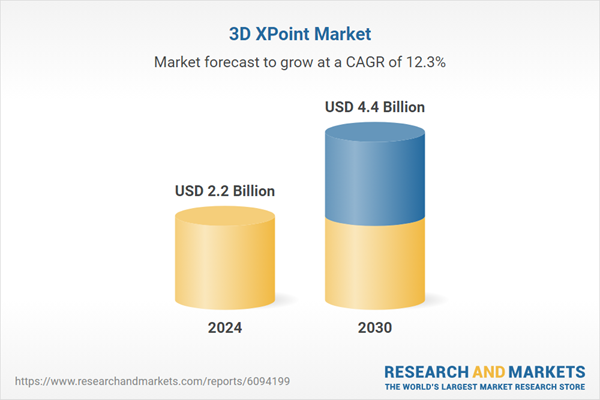Global 3D XPoint Market - Key Trends & Drivers Summarized
Why Is 3D XPoint Memory Emerging as a Disruptive Bridge Between DRAM and NAND in High-Performance Computing and Data-Centric Architectures?
3D XPoint memory technology is gaining traction as a non-volatile, high-speed storage-class memory (SCM) designed to fill the performance gap between dynamic RAM (DRAM) and NAND flash. Co-developed to enable persistent memory with near-DRAM latency and higher endurance than NAND, 3D XPoint offers significant advantages in data-intensive workloads, including real-time analytics, in-memory databases, virtualization, and high-performance computing (HPC).Its ability to retain data without power and deliver ultra-low latency access times is transforming how memory hierarchies are architected, particularly in cloud data centers, AI training clusters, and financial trading systems. By enabling byte-addressable persistence and greater throughput under mixed read/write loads, 3D XPoint supports next-generation computing paradigms where latency, endurance, and scalability are mission-critical. As enterprise IT evolves toward more memory-centric computing, this technology represents a key enabler of real-time data processing and reduced bottlenecks in multi-tier storage stacks.
How Are System Architectures, Interface Standards, and Use Case Expansion Shaping the Evolution of 3D XPoint Technology?
The deployment of 3D XPoint has advanced through modules like Intel Optane, which leveraged NVMe and DDR interfaces to integrate seamlessly with existing systems. These modules are being used either as high-speed SSDs or persistent memory DIMMs, offering system architects flexibility in balancing memory capacity and performance. As server architectures evolve to support hybrid memory models, 3D XPoint enables greater memory density per socket without the volatility or cost scaling constraints of DRAM.Ecosystem support for persistent memory programming models - through operating system, database, and application-level optimization - is expanding the addressable market for 3D XPoint. Workloads that benefit from fast access to large datasets, such as genomics, machine learning, and real-time risk modeling, are increasingly adopting SCM-based architectures. Industry efforts to enhance compatibility with CXL (Compute Express Link) and other next-gen interconnect standards are also positioning 3D XPoint for broader integration in disaggregated and composable infrastructures.
While manufacturing challenges and economic viability continue to influence product roadmap decisions, innovations in cross-point array scaling, multi-level cell operation, and controller design are helping optimize endurance and bit density for future iterations.
Which Enterprise Segments, Applications, and Global Regions Are Driving Interest in 3D XPoint-Based Solutions?
Adoption is strongest among hyperscale data centers, financial institutions, and scientific research facilities that require rapid data access and large memory footprints for critical workloads. Enterprises running in-memory databases (e.g., SAP HANA), content delivery networks, and complex simulations are turning to 3D XPoint to improve speed, reduce latency, and lower total cost of ownership by reducing DRAM dependency.North America remains the dominant market due to the presence of cloud hyperscalers, HPC clusters, and enterprise adopters with performance-centric infrastructure requirements. Europe follows with demand from AI research labs and industrial analytics platforms, while Asia-Pacific is gaining momentum as large-scale digital transformation and edge AI deployments accelerate across China, South Korea, and Japan.
Emerging applications include real-time fraud detection, autonomous driving simulations, genomic sequencing, and blockchain processing - all of which require low-latency, high-endurance memory solutions capable of handling volatile and persistent data with equal efficiency.
What Is Driving the Strategic Significance of 3D XPoint in the Future of Memory-Centric Compute Architectures?
3D XPoint is strategically positioned to redefine memory-storage convergence by addressing the limitations of both DRAM (cost, volatility) and NAND (latency, endurance). As workloads demand immediate access to expanding datasets and persistent memory becomes integral to system design, 3D XPoint fills a critical niche in reshaping compute hierarchies around data rather than processors.Key growth drivers include the exponential growth of unstructured data, the need for real-time analytics at the edge and core, and increasing demand for high-throughput, low-latency systems. Industry focus on AI/ML acceleration, edge-to-cloud coherence, and energy-efficient architectures further underscores the relevance of persistent, high-speed memory technologies.
As computing moves toward disaggregated, memory-centric paradigms, could 3D XPoint unlock the next leap in speed, scalability, and architecture-level efficiency for data-first infrastructure?
Report Scope
The report analyzes the 3D XPoint market, presented in terms of market value (US$). The analysis covers the key segments and geographic regions outlined below:- Segments: Storage Type (750 GB Storage, 1.5 TB Storage, Other Storage Types); End-Use (Telecommunications End-Use, Consumer Electronics End-Use, Automotive End-Use, Healthcare End-Use, Retail End-Use, Other End-Uses).
- Geographic Regions/Countries: World; United States; Canada; Japan; China; Europe (France; Germany; Italy; United Kingdom; Spain; Russia; and Rest of Europe); Asia-Pacific (Australia; India; South Korea; and Rest of Asia-Pacific); Latin America (Argentina; Brazil; Mexico; and Rest of Latin America); Middle East (Iran; Israel; Saudi Arabia; United Arab Emirates; and Rest of Middle East); and Africa.
Key Insights:
- Market Growth: Understand the significant growth trajectory of the 750 GB Storage segment, which is expected to reach US$2.7 Billion by 2030 with a CAGR of a 14.1%. The 1.5 TB Storage segment is also set to grow at 9.5% CAGR over the analysis period.
- Regional Analysis: Gain insights into the U.S. market, valued at $598.7 Million in 2024, and China, forecasted to grow at an impressive 16.8% CAGR to reach $938.3 Million by 2030. Discover growth trends in other key regions, including Japan, Canada, Germany, and the Asia-Pacific.
Why You Should Buy This Report:
- Detailed Market Analysis: Access a thorough analysis of the Global 3D XPoint Market, covering all major geographic regions and market segments.
- Competitive Insights: Get an overview of the competitive landscape, including the market presence of major players across different geographies.
- Future Trends and Drivers: Understand the key trends and drivers shaping the future of the Global 3D XPoint Market.
- Actionable Insights: Benefit from actionable insights that can help you identify new revenue opportunities and make strategic business decisions.
Key Questions Answered:
- How is the Global 3D XPoint Market expected to evolve by 2030?
- What are the main drivers and restraints affecting the market?
- Which market segments will grow the most over the forecast period?
- How will market shares for different regions and segments change by 2030?
- Who are the leading players in the market, and what are their prospects?
Report Features:
- Comprehensive Market Data: Independent analysis of annual sales and market forecasts in US$ Million from 2024 to 2030.
- In-Depth Regional Analysis: Detailed insights into key markets, including the U.S., China, Japan, Canada, Europe, Asia-Pacific, Latin America, Middle East, and Africa.
- Company Profiles: Coverage of players such as 3D Weaving SaRL, Albany International Corp., Bally Ribbon Mills, Biteam AB, Cetriko S.L. and more.
- Complimentary Updates: Receive free report updates for one year to keep you informed of the latest market developments.
Some of the 48 companies featured in this 3D XPoint market report include:
- Adata Technology Co., Ltd.
- Adesto Technologies Corporation
- Broadcom Inc.
- Crossbar Inc.
- Dell Technologies Inc.
- Fujitsu Limited
- Hewlett Packard Enterprise (HPE)
- IBM Corporation
- Intel Corporation
- Kingston Technology Company, Inc.
- Kioxia Corporation
- Lenovo Group Limited
- Micron Technology, Inc.
- Mushkin Inc.
- NetApp, Inc.
- Numonyx B.V.
- Pure Storage, Inc.
- Samsung Electronics Co., Ltd.
- SanDisk Corporation
- Seagate Technology Holdings PLC
This edition integrates the latest global trade and economic shifts into comprehensive market analysis. Key updates include:
- Tariff and Trade Impact: Insights into global tariff negotiations across 180+ countries, with analysis of supply chain turbulence, sourcing disruptions, and geographic realignment. Special focus on 2025 as a pivotal year for trade tensions, including updated perspectives on the Trump-era tariffs.
- Adjusted Forecasts and Analytics: Revised global and regional market forecasts through 2030, incorporating tariff effects, economic uncertainty, and structural changes in globalization. Includes historical analysis from 2015 to 2023.
- Strategic Market Dynamics: Evaluation of revised market prospects, regional outlooks, and key economic indicators such as population and urbanization trends.
- Innovation & Technology Trends: Latest developments in product and process innovation, emerging technologies, and key industry drivers shaping the competitive landscape.
- Competitive Intelligence: Updated global market share estimates for 2025, competitive positioning of major players (Strong/Active/Niche/Trivial), and refined focus on leading global brands and core players.
- Expert Insight & Commentary: Strategic analysis from economists, trade experts, and domain specialists to contextualize market shifts and identify emerging opportunities.
Table of Contents
Companies Mentioned (Partial List)
A selection of companies mentioned in this report includes, but is not limited to:
- Adata Technology Co., Ltd.
- Adesto Technologies Corporation
- Broadcom Inc.
- Crossbar Inc.
- Dell Technologies Inc.
- Fujitsu Limited
- Hewlett Packard Enterprise (HPE)
- IBM Corporation
- Intel Corporation
- Kingston Technology Company, Inc.
- Kioxia Corporation
- Lenovo Group Limited
- Micron Technology, Inc.
- Mushkin Inc.
- NetApp, Inc.
- Numonyx B.V.
- Pure Storage, Inc.
- Samsung Electronics Co., Ltd.
- SanDisk Corporation
- Seagate Technology Holdings PLC
Table Information
| Report Attribute | Details |
|---|---|
| No. of Pages | 294 |
| Published | February 2026 |
| Forecast Period | 2024 - 2030 |
| Estimated Market Value ( USD | $ 2.2 Billion |
| Forecasted Market Value ( USD | $ 4.4 Billion |
| Compound Annual Growth Rate | 12.3% |
| Regions Covered | Global |









